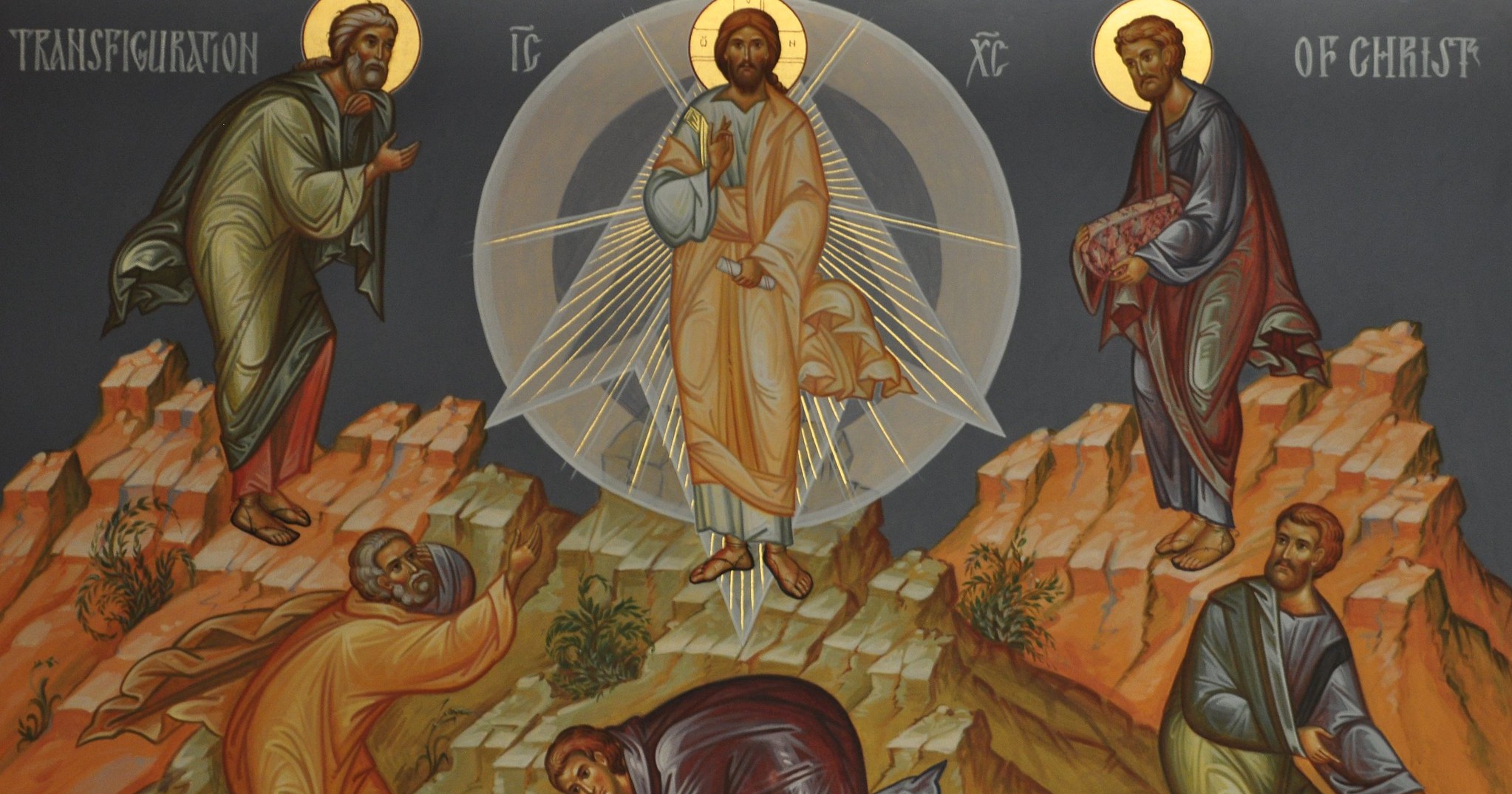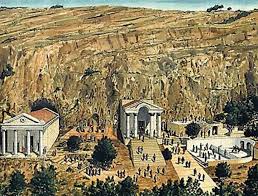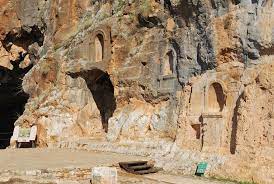
Luke 9:28-36 (Matins)
2 Peter 1:10-19
Matthew 17:1-9
"This Is My Beloved Son"
.... suddenly a voice came out of the cloud, saying,
"This is My beloved Son,
in Whom I am well pleased. Hear Him!"
(Mt 17:5)
In the Name of the Father and of the Son and of the Holy Ghost. Amen.
Just yesterday we discussed Jesus unveiling His Identity.
He roams as a disguised King through the encampments of His people.
And our own identities, as we insist on the prerogative
to claim our own truths,
to write our own rules,
and
to decide who and what we are ....
a brilliant light has shone,
and
it shines on us revealing
our pettiness,
our smallness,
our willfulness,
our futile attempts to contrive identity ... as if we could.
And we have done this even to the point
point of surgical alteration
and
destructive pharmaceuticals.
These are deep waters, indeed.
They cannot be settled in news headlines
or
in the opinions of pop culture.
Many have chosen to claim identity based on their sexual urges and preferences.
But what could be more shallow?
What could possibly doom us more certainly to emptiness and confusion at life's end:
to have decided identity on the basis of carnal desire?
Truly,
we have made sex the end-all and be-all
until our real selves have been buried
and
suffocated by it.
No,
the questions we face are far deeper than darting desires
or
the excesses of dark imagination.
As we have shared in previous meditation,
God,
Who is the deep center, the kernel, the basis of our identity is inscrutable and unknowable.
So wrote the Cappadocian Father, St. Gregory of Nyssa.
By that same measure,
we who are made in God's Image
are also unknowable and inscrutable.
But this is a challenge not a fate.
Coming to a stable and right identity is the purpose and end-point of human life,
which has become a manic obsession in our own historical era.
But having rejected God,
we have entered the trap and, finally, the tragedy of
seeking something else to fill that vast emptiness.
Life is about relationship with God,
our personal development through God,
and
identity in the depths of God.
The sincere heart asks,
but how can we do this since we do not know where we are going
nor
even what our destination should look like?
This was the state of the world before the Advent of Christ.
And
this was the riddle God countenanced
and
answered
by
sending His Son into the world.
The Church Fathers explored this subject at length.
St. Athanasius wrote that
the portrait of humankind had been defaced through sin,
but how could it be restored since no model could sit for it?
What should humankind look like?
What is the true image of God's adopted sons and daughters?
One century earlier,
Origen wrote
that the Great Emperor's Image had been stamped upon silver coins,
but the grit and darkness of the world
had worn down these once brilliant coins to indecipherable slugs.
We no longer knew what we were made to be.
We had forgotten who we were.
So
the Great Emperor sent the Heir that the Divine Image might be
restamped upon the coin.
He would set His countenance upon our silver.
He would sit for the portrait of humanity.
He would show us the noble Image that all humans were created to bear.
For three years Jesus presented the Royal Image to men and women throughout the Levant,
which was the historical setting for the Lost Tribes of Israel.
But recognizing this Image,
coming to the deep insight
that it was, in fact,
their own ....
this would be no simple process.
The people must be driven to reach back through the mists of time,
to delve into the deep recesses of their racial memory,
to pore over the Holy Scriptures with comprehensive understanding,
and
to approach this subject with the sensitive intelligence of an angel.
Only a searching heart and soul might take up this work.
So He challenged them,
taking them to the brink of their settled assumptions,
and beyond,
driving them further,
further than they wanted to go:
into the teeth of mighty tempests,
surrounded by legions of demons,
midst the deafening hoof beats of wild boars,
and
beset by menacing authority figures
centered in the Zion Temple ....
and
all subjugated by centuries of imperial occupiers.

Directing them to reflect on the latter,
Jesus led His Disciples to Caesarea-Philippi,
an ancient center of spiritual power in the pagan world.
Here, the most ancient god, Pan,
was worshiped in one of his primary shrines,
the temple at Pan's Grotto at Banias.
The pagans understood Pan to preside over the entire natural order.
His antiquity and prestige were considered to be coeval
with Creation itself.
Here also at Caesarea-Philippi stood the Temple to Augustus,
built from massive white stones soaring skyward.
Of this Temple, Flavius Josephus wrote,
|
And when he [Herod the Great] returned home after escorting Caesar [Augustus] to the sea,
he erected to him a very beautiful temple of white stone ....
near the place called Paneion. In the mountains here there is a beautiful cave,
and below it the earth slopes steeply to a precipitous and inaccessible depth,
which is filled with still water, while above it is a very high mountain.
Below the cave, rise the sources of the river Jordan.
It was this most celebrated place that Herod further adorned with the temple which
he consecrated to Caesar (Antiquities 15: 363-364; Loeb 8: 175-177).
|
It was here,
at the sacred head waters of the Jordan,
with its cool mists refreshing pilgrims in the Levantine heat,
that
Jesus seated His Disciples.
Behind the Master loomed these revered shrines of the pagan world.
And He asked them,
|
"Who do you say that I AM?"
(Mk 8:29, Mt 16:15, Lu 9:20)
|
Among all the gods, among all kings and emperors, among all the power-brokers of this world,
"Who do you say I AM?"

From there Jesus took them to the highest mountain summit,
standing next to Pan's Grotto.
Not all of His Disciples were permitted to ascend
just as not all Israelites were permitted to ascend Mt. Sinai
—
only the sons of Zebedee and Peter.
As Moses had, they ascended into a Divine world,
in fact,
encountering
Moses .... and Elijah.
We might say they stood before the Law and the Prophets.
But let us not forget during this fore-season of the Dormition of the Most Holy Theotokos,
that they stood before the deathless ones.
For Moses left no tomb
(which would have become a cherished shrine like Abraham's or the other Patriarchs),
and
Elijah was assumed directly into Heaven riding a flaming chariot.
Peter falling down nearly blind said,
|
"Lord, it is well that we are here; if You wish, I will make three booths here,
one for You and one for Moses and one for Eli'jah."
(Mt 17:5)
|
.... remembering the booths he saw carved into the hillside at the Grotto of Pan,
likening the prophets to pagan gods.
But his foolishness is quickly interrupted
by the thunderous tones of God the Father:
|
"This is My beloved Son, in Whom I am well pleased. Hear Him!"
(Mt 17:5)
|
Do you see?
While Peter is in mid-sentence,
a cloud overshadows them
and
a commanding Voice is heard:
"This is My Son.
Hear Him!"
Peter is silenced.
This is no pagan god,
no vain cultural belief,
nor
the invention of a benighted imagination.
"Hear Him!" the Father thunders,
for the Son has been sent to be our only Guide and Exemplar.
Yes,
the Disciples were taken to the brink of human capacity and beyond.
They were shown the shallows of their own minds
and
the limits of human knowledge.
In its place is set One Whose
|
.... face shone like the sun, and His clothes became as white as the light.
(Mt 17:2)
|
Here finally is our Identity.
Here is who we are,
our destination,
our
birthright.
The human portrait is superabundantly renewed.
The Great Emperor's face has been minted with the purest white silver.
The Lord's face is revealed,
and
with it our own.
Finally, our restless seeking after identity
—
in surgeons' operating rooms,
through self-destroying drugs,
on psychiatrists' couches,
our laying claim to silly "avatars" on Facebook and Instagram
—
it all comes to an end.
And we have peace unto our very souls.
Finally, an end .... and peace.
In the Name of the Father and of the Son and of the Holy Ghost.
Amen.


